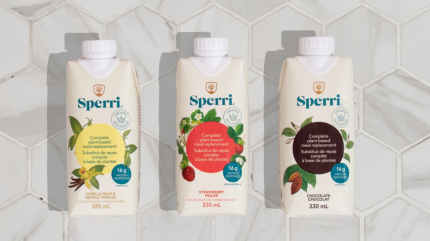

Sperri has secured new investment, which the Canadian plant-based meal replacement beverage maker said will help fund its US expansion.
The cash injection was led by Canadian venture capital fund Nàdarra Ventures and supported by Invest Nova Scotia, the province’s business development agency.
Halifax-based Sperri has just gained access to the US market through the direct-to-consumer (D2C) channel with online supplier Amazon.
“Our products are grounded in scientific research leading to effective medical nutrition, and the ethos of Sperri is to inspire change within our conventional healthcare systems,” said Gregg Curwin, co-founder of Sperri.
“We are rooted in the belief that food is medicine, and that not only Nova Scotians, but everyone throughout North America, needs that more than ever.
“Sperri products are designed to be accessible, affordable, and effective, ultimately becoming a major benefit to primary care treatment, in a time of critical need to relieve pressure from our healthcare system.”
Access the most comprehensive Company Profiles
on the market, powered by GlobalData. Save hours of research. Gain competitive edge.

Company Profile – free
sample
Your download email will arrive shortly
We are confident about the
unique
quality of our Company Profiles. However, we want you to make the most
beneficial
decision for your business, so we offer a free sample that you can download by
submitting the below form
By GlobalData
Founded in 2019, Sperri is Canada’s first plant-based meal replacement brand, which is available for purchase locally through Loblaws, Sobeys, Amazon and its online shop. Flavours include chocolate, strawberry and vanilla maple.
Nàdarra Ventures managing partner Malcolm Fraser said: “This investment represents our focus on sustainable, natural product innovations that create industry leading returns, while generating measurable impacts on the health of our population and planet.”
Dr Mary Lynch, the other co-founder of Sperri, is a physician and pain management specialist. She jointly launched the company when she observed that many of her patients required meal replacements to access proper nutrition, but “struggled to tolerate existing options due to high levels of processed sugars, dairy, gluten and soy protein”.

